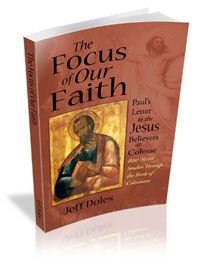Eschatology is a theological term that refers to the doctrine of “last things.” Some people think it is about the “end of the world.” And in one sense, it is. Not “end” as in destruction, but as in fulfillment; that is, the end or purpose for which the world was created.
New Life has come. Jesus, the Word who from the beginning was with God and is God, has come into the world (John 1:1). “The Word became flesh and dwelt among us” (John 1:14). In Him is life and the life is the light of humanity (John 1:4). This life is related to the kingdom of God. Jesus said that unless one is “born again” he cannot see or enter the kingdom (John 3:3, 6). The Greek words for “born again” literally mean “born from above.” It is not only
new life, it is life that is higher in quality because it is higher in origin. It is life born of the Spirit of God, the life of heaven, the life of the kingdom of God breaking into the world. Jesus came to give us that life. “I have come that you may have life and that you may have it more abundantly” (John 10:10). This is eternal life and it has already begun for all who receive Jesus by faith.
The True Light has come. In Jesus is life and the life is the light of humanity. He is the “true light” who gives light to everyone who comes into the world (John 1:9). “For it is the God who commanded light to shine out of darkness, who has shone in our hearts to give the light of the knowledge of the glory of God in the face of Jesus Christ” (2 Corinthians 4:6). “For you were once darkness, but now you are light in the Lord. Walk as children of light” (Ephesians 5:8). “Therefore He says: ‘Awake, you who sleep, arise from the dead, and Christ will give you light’” (Ephesians 5:14). “You are all sons of light and sons of the day. We are not of the night nor of darkness.” (1 Thessalonians 5:5). “The darkness is passing away, and the true light is already shining” (1 John 2:8). There is no other light to come, the true light is already here.
The Kingdom of God has come. Jesus came preaching the gospel of the kingdom of God, saying, “The time is fulfilled, and the kingdom of God is at hand. Repent, and believe in the gospel” (Mark 1:14-15). By “at hand,” Jesus was saying that the kingdom was now here, that it was being inaugurated. “From the days of John the Baptist until now, the kingdom of heaven has been forcefully advancing, and forceful men lay hold of it” (Matthew 11:12 NIV). Though it has not yet arrived in all its fullness, it has already begun and all who receive new life in Jesus can see and enter in and experience its power and glory.
The New Covenant has come. Through the prophet Jeremiah, God foretold the days of the new covenant, for the old one had been broken because of unfaithfulness.
Behold, the days are coming, says the LORD, when I will make a new covenant with the house of Israel and with the house of Judah — not according to the covenant that I made with their fathers in the day that I took them by the hand to lead them out of the land of Egypt, My covenant which they broke, though I was a husband to them, says the LORD. But this is the covenant that I will make with the house of Israel after those days, says the Lord: I will put My law in their minds, and write it on their hearts; and I will be their God, and they shall be My people. No more shall every man teach his neighbor, and every man his brother, saying, “Know the LORD,” for they all shall know Me, from the least of them to the greatest of them, says the LORD. For I will forgive their iniquity, and their sin I will remember no more. (Jeremiah 31:31-34)
Jesus instituted this new covenant between God and man, as He was perfectly suited to do, seeing that He is fully divine as well as fully human. This covenant is based on better promises and cut in His own blood (Hebrews 8:6; Luke 22:20). There is not another covenant to come; this one is eternal.
The Spirit of God has come. God spoke of the same end time event through the prophet Ezekiel as He did through Jeremiah. It would be a time when He would give His people a new heart and put His Spirit within them.
I will give you a new heart and put a new spirit within you; I will take the heart of stone out of your flesh and give you a heart of flesh. I will put My Spirit within you and cause you to walk in My statutes, and you will keep My judgments and do them. (Ezekiel 36:26-27)
Through the prophet Joel, He said, “And it shall come to pass afterward, that I will pour out My Spirit on all flesh; your sons and your daughters shall prophesy, your old men shall dream dreams, your young men shall see visions. And also on My menservants and on My maidservants I will pour out My Spirit in those days” (Joel 2:28-29).
This was fulfilled at Pentecost, when God poured out His Spirit on the Church. Filled with the Holy Spirit, all the disciples began speaking and praising God with other tongues, as the Spirit gave them utterance. Peter stood and declared, “This is what was spoken by the prophet Joel,” then began quoting the passage from Joel 2, “And it shall come to pass in the last days …”
Paul spoke of being led by the Spirit and said that those who are, are not under the Law (Galatians 5:18). “But the fruit of the Spirit is love, joy, peace, longsuffering, kindness, goodness, faithfulness, gentleness, self-control. Against such there is no law” (Galatians 5:22-23). The Spirit leads us in the ways of God and produces in us things that the Law of Moses could never do.
New Creation has begun. Jesus is the “the Second Man” and “the Last Adam,” Lord over the new creation. Everyone who is in the Messiah (who receives Him by faith and is counted as His) is part of this new creation. “Therefore, if anyone is in Christ, he is a new creation; old things have passed away; behold, all things have become new” (2 Corinthians 5:17). “For in Christ Jesus neither circumcision nor uncircumcision avails anything, but a new creation” (Galatians 6:15). Jesus said, “Behold, I make all things new” (Revelation 21:5).
Resurrection has begun. The resurrection of the righteous has already begun with the resurrection of Jesus from the dead. “But now Christ is risen from the dead, and has become the firstfruits of those who have fallen asleep … For as in Adam all die, even so in Christ all shall be made alive. But each one in his own order: Christ the firstfruits, afterward those who are Christ’s at His coming.” (1 Corinthians 15:20, 22-23). “And He is the head of the body, the church, who is the beginning, the firstborn from the dead, that in all things He may have the preeminence” (Colossians 1:18). Just as the firstfruits assures the harvest, the resurrection of Jesus from the dead is the assurance that all those who belong to Him will also be raised bodily from the dead when He comes again.
The reign of King Jesus has begun. After the resurrection, Jesus came to the disciples and said, “All authority has been given to Me in heaven and on earth” (Matthew 28:18). Then He ascended to His throne at the right hand of the Father. God “raised Him from the dead and seated Him at His right hand in the heavenly places, far above all principality and power and might and dominion, and every name that is named, not only in this age but also in that which is to come. And He put all things under His feet, and gave Him to be head over all things to the church, which is His body, the fullness of Him who fills all in all” (Ephesians 1:20-23). God has also “made us alive together with Christ … and raised us up together, and made us sit together in the heavenly places in Christ Jesus” (Ephesians 2:5-6). Not only has King Jesus begun His reign, but we also have been seated in the place of ruling and reigning with Him.
Biblically speaking, we are now in the “last days,” and have been ever since the coming of Jesus the Messiah into the world. The “last things” have begun. We are living in the days of the King, between the times of inauguration and final fulfillment, when He shall come again.






















